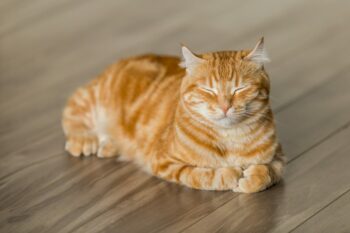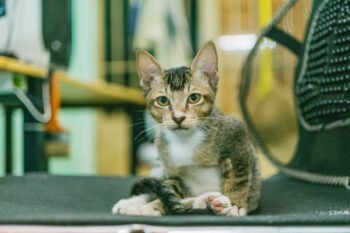Most people don’t think of a cat as a four-legged war machine. A feline that is napping on a soft blanket, playfully pouncing on its favorite toy or rubbing up against his/her human doesn’t exactly look like a soldier. But make no mistake. Your feline friend is a kitty combatant, battling 24/7 to defeat a tenacious enemy. That enemy is germs, and the stakes are your cat’s health — even its life.
Fortunately, your cat’s equipped with a remarkable set of defenses: its immune system. But while this system is amazing, it’s not always able to withstand assaults from germs and to fight off resulting illnesses. That’s where you come in. You can strengthen your cat’s immune system so that your pet is better able to combat germs and disease by following these four steps.
Step One: Feed Well
Just like you, your cat needs good nutrition to keep its immune system in tip-top shape. “We do believe diet is important,” says Vicky Thayer, DVM, who is on the board of directors of the American Association of Feline Practitioners and owns Purrfect Practice, P.C. in Lebanon, Ore. She recommends a diet that’s high in proteins — particularly those with amino acids, such as taurine, arginine and carnitine — and relatively low in carbohydrates. Proteins are crucial to building and maintaining immune system strength. High-quality manufactured cat foods can fit this need. Access to freshwater is also important.
Step Two: Reduce Stress
Stress can lower your cat’s bodily defenses, so keeping stress to a minimum is important. “Crowding with too many other cats, poor sanitation and poor ventilation increase exposure to pathogens and stress,” says Dr. Thayer. “And I have historically seen that if one has more than five cats, especially in a smaller space, the number of behavior issues and illnesses seem to increase.”
Popular strategies for reducing stress in cats’ lives include giving them a private, cozy space all to themselves, adding structure to their daily schedules through mealtimes and play, and supporting their diet with calming supplements like pet CBD oil.
Step Three: Enrich the Environment
A good diet, clean home and plenty of personal space aren’t always enough to strengthen a cat’s immune system, although they certainly help. Equally important is an environment that provides lots of exercise opportunities and chances for your cat to tap into its natural instincts. “Regular moderate exercise enhances immune function,” explains Dr. Thayer. “Play toys, especially with owners, multilevel housing structures, ramps and outdoor enclosures all help. Cats have historically been hunters and outdoors looking for prey. Adding some of this natural behavior back to their [indoor] routine is important to keeping them disease-free and healthy.”
Step Four: Consider Alternatives
Some alternative (also known as complementary) therapies may go a long way toward reducing the stresses that can compromise a cat’s immune system. Dr. Thayer maintains, “Anything that relieves pain and stress for cats helps their immune systems. So massage and acupuncture all have their uses.” That said, it’s a good idea to consult your veterinarian before treating your cat with any alternative therapies.
Keeping your cat healthy doesn’t have to be difficult. Just give your pet the weapons it needs to keep its immune system strong and to fight off disease. These include a good diet, minimal stress, a rich home environment and openness to alternative therapies. With that strategy in place, you’ll greatly increase your feline friend’s ability to win the battles against illness for years to come.






